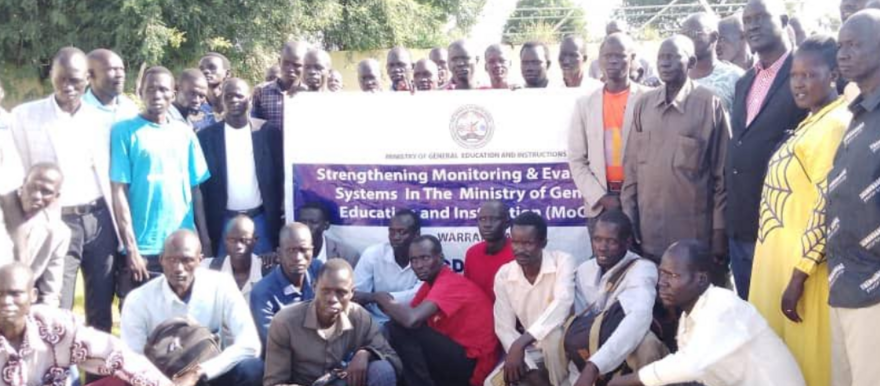The National Ministry of General Education and Instruction on Friday concluded a three-day monitor and evaluation training for 60 headteachers and supervisors in the Warrap State capital, Kuajok.
The training brought was attended by headteachers and supervisors from the six counties of Warrap state and aimed to train heads of schools on how to monitor and evaluate teachers’ performance.
Mabor Tur, the national team leader said the training is a national program intended to provide quality education to school children across South Sudan.
“The purpose of the training is to make headteachers familiarize themselves with monitoring and evaluation values which are strategies, tools, and indicators of monitoring and evaluation,” he explained. “Monitoring and evaluation is applied in schools to measure the performance of administration, finance and in enhancing teaching services. If you do not measure the performance of teachers, you will not know the services you are providing to the school children.”
“We plan to train 70, 000 school headteachers across the country to improve teaching and administration in the ten states and three administrative areas,” Tur added.
For his part, John Deng Aleu, the director general at the Warrap State education ministry, urged the trainees to put the acquired knowledge into practice.
“My message to you is to put what you have learned in the three days of training to practice in schools and it should mold teachers. The aim is to commit and improve administration and teaching so go to the field and make good use of what you have acquired,” he advised. “The quality of education in the community depends on teachers, it starts from lesson planning and the scheme of work.”
“Teachers who do not practice the teaching methodology do not fail to provide quality education,” Deng added.
Meanwhile, Aluel Mayen, one of the participants who is the headmistress of Kuajok Girls Primary School, said she benefited from the training and will now be able to monitor teachers under her watch.
“I have benefited a lot during this three-day workshop because it taught us how to properly manage the assets of the school and the teachers. After the training, I will put the knowledge into practice and I will tell teachers to be very smart and exemplary to the pupils,” she said. “I will tell my teachers not to fear supervisors from the ministry who enter classes and sit behind while they are teaching.”
Another headteacher, Justin Akoon of Mayen Gumel Primary School, said it was his first time knowing the importance of monitoring and evaluation.
“I learned so much because it is the first time for some of us to know the differences between monitoring and evaluation and the tools used like the school reporting format, child-friendly school index space, and teachers’ classroom observation which is the observation carry out when a teacher is delivering a lesson in the classroom,” he said.




